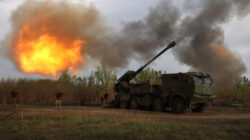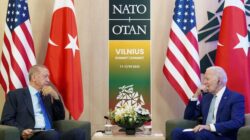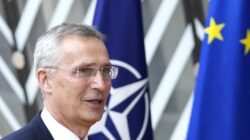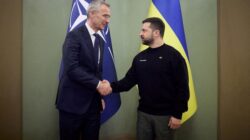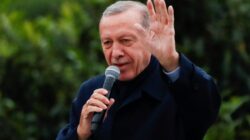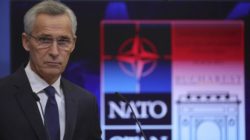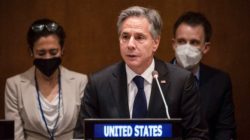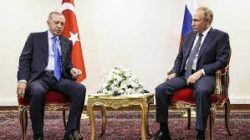UNITED NATIONS — The United Nations Secretary-General cautioned the world on Monday that “humanity is just one misunderstanding, one miscalculation away from nuclear destruction,” citing the Ukraine conflict, nuclear threats in Asia and the Middle East, among other causes.
The dire warning was issued by Secretary-General Antonio Guterres at the start of a long-delayed high-level meeting to review the landmark 50-year-old treaty aimed at halting the spread of nuclear weapons and finally reaching a nuclear-free world.
The prospect of increased nuclear threats and a nuclear disaster was also addressed by the United States, Japan, Germany, the UN nuclear chief, and many other opening speakers at the meeting to review progress and agree on next steps to execute the Nuclear Nonproliferation Treaty, or NPT.
North Korea is preparing to conduct its seventh nuclear test, Iran “has either been unwilling or unable” to accept a deal to return to the 2015 nuclear agreement aimed at reining in its nuclear program, and Russia is “engaged in reckless, dangerous nuclear saber-rattling” in Ukraine, according to US Secretary of State Antony Blinken.
He noted Russian President Vladimir Putin’s warning following the February 24 invasion that any attempt to interfere would result in “consequences you have never seen,” highlighting his country’s status as “one of the most powerful nuclear powers.”
Japan’s Prime Minister, Fumio Kishida, said that divisions in the world have grown since the last review conference in 2015, which ended without a consensus document, and that Russia’s threat to use nuclear weapons in the Ukraine war has contributed to “global concern that yet another catastrophe by nuclear weapon use is a real possibility.”
Annalena Baerbock, Germany’s Foreign Minister, accused Russia of “brutally breaking the pledges” it offered Ukraine in 1994, and said Moscow’s “reckless nuclear language” after its invasion of its smaller neighbor “threatens all the NPT has achieved in five decades.”
Blinken recently claimed that Russia has seized Europe’s largest nuclear power plant in Zaporizhzhya and is using it as a military base from which to fire at Ukrainians, “knowing that they can’t and won’t shoot back because they might accidentally strike a nuclear reactor or highly radioactive waste in storage.” According to him, this takes the concept of having “a human shield to a totally different and horrifying level.”
According to Rafael Grossi, Director General of the International Atomic Energy Agency, the Ukraine war is “so dangerous that the prospect of a potential nuclear confrontation, or accident, has risen its scary head once more.”
He warned that “the situation at the Zaporizhzhya nuclear plant is getting more risky by the day,” and he begged all countries to help fund his journey to the plant with a team of IAEA safety and security specialists, claiming his efforts over the previous two months had been futile.
Guterres told the gathering ministers, bureaucrats, and diplomats that the month-long review conference is taking place “during a time of nuclear threat not witnessed since the height of the Cold War.”
According to the secretary-general, the meeting is “an opportunity to hammer out the steps that will help avoid certain calamity and to put humanity on a new path toward a future free of nuclear weapons.”
However, Guterres warned that “geopolitical weapons are reaching new highs,” that about 13,000 nuclear weapons are in global arsenals, and that countries seeking “false security” are spending hundreds of billions of dollars on “doomsday weapons.”
“All of this at a time when the risks of proliferation are increasing and safeguards to prevent escalation are weakening,” he said, “and when crises — with nuclear undertones — are festering everywhere from the Middle East and the Korean Peninsula to Russia’s invasion of Ukraine, and many other factors.”
Guterres urged conference participants to take several actions, including urgently reinforcing and reaffirming “the 77-year-old norm against the use of nuclear weapons,” working relentlessly toward nuclear weapons elimination with new commitments to reduce arsenals, addressing “the simmering tensions in the Middle East and Asia,” and promoting the peaceful use of nuclear technology.
“Future generations rely on your willingness to take a step back from the abyss,” he pleaded with the ministers and diplomats. “This is our chance to meet this fundamental test and finally lift the shroud of nuclear devastation.”
Kishida of Japan, commemorating his home city of Hiroshima, where the first atomic bomb was unleashed in August 1945, reiterated many of Guterres’ concerns, stating that the path to a nuclear-free world has gotten more difficult, but “giving up is not an option.”
The Nonproliferation Treaty, or NPT, has had the broadest adherence of any arms control accord, with 191 countries participating.
Under its terms, the five original nuclear powers — the United States, China, Russia (then the Soviet Union), Britain, and France — agreed to negotiate the eventual elimination of their arsenals, while nations without nuclear weapons agreed not to acquire them in exchange for the assurance of being able to develop nuclear energy for peaceful purposes.
India and Pakistan, which did not sign the NPT, obtained the bomb. North Korea ratified the agreement but afterwards declared its withdrawal. Non-signatory Israel is suspected of possessing a nuclear arsenal, but neither confirms nor rejects this. Nonetheless, as a framework for international collaboration on disarmament, the treaty has been praised with reducing the number of nuclear arrivals (US President John F. Kennedy originally predicted as many as 20 nuclear-armed nations).
The meeting, which concludes on August 26, intends to create agreement on next measures, although expectations are low for a significant – if any – accord. As of Monday, there were 133 speakers and dozens of side activities.
The NPT’s five-year review was planned to take place in 2020, when the world was already facing numerous crises, but it was postponed due of the COVID-19 pandemic.
“President Putin’s threats to deploy nuclear weapons have stunned the international community,” said Patricia Lewis, former head of the UN Institute for Disarmament Research and currently in charge of international security programs at the international affairs think tank Chatham House in London.
Russia is not only a signatory to the NPT but also a repository for treaty ratifications, and in January it joined the four other nuclear powers in reiterating former US President Ronald Reagan and former Soviet leader Mikhail Gorbachev’s statement that “a nuclear war can never be won and must never be fought,” she told The Associated Press.
According to Lewis, countries participating in the review meeting will face a difficult dilemma.
“Governments will have to address Russia’s behavior and threats,” she said, in order to support the pact and what it stands for. “However, doing so risks splitting treaty members, some of whom have been persuaded by Russia’s propaganda or are not as concerned, for example, as NATO states.”
And, according to Lewis, “Russia will very sure fiercely protest to being mentioned in remarks and any outcome materials.”
Source: AP



